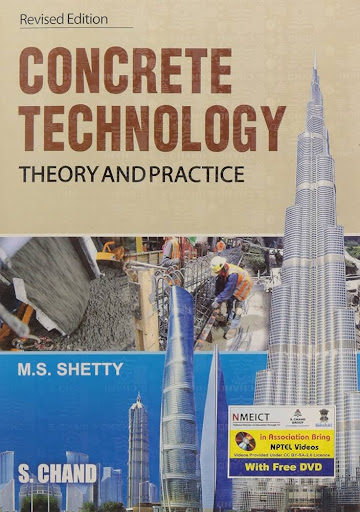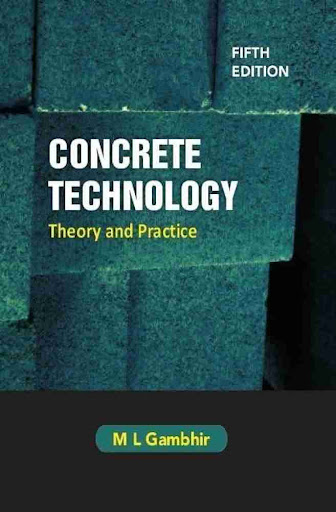Concrete Technology Books Collection Free Download – We have compiled a list of Best & Regular Concrete Technology Subject Reference Books.
Students from top universities, institutes, and colleges make use of these books. Concrete is a mixture of paste and aggregates in its simplest form (rocks).
The paste coats the surface of the fine (small) and coarse (larger) aggregates, composed essentially of portland cement and water.
The paste hardens and gains strength through a series of chemical reactions called hydration to form the rock-like mass known as concrete.
Concrete Technology Books Download
Best Concrete Technology Books Collection –
| Book Name | Author’s Name |
|---|---|
| ADVANCED CONCRETE TECHNOLOGY TESTING AND QUALITY | BY JOHN NEWMAN AND BAN SENG CHOO |
| ENGINEERED CONCRETE MIX DESIGN AND TEST METHODS | BY IRVING KETT |
| CONCRETE MIX DESIGN, QUALITY CONTROL AND SPECIFICATION | BY KEN W DAY |
| CONCRETE ADMIXTURES HANDBOOK PROPERTIES, SCIENCE AND TECHNOLOGY | BY V S RAMACHANDRAN |
| ADVANCED CONCRETE TECHNOLOGY | BY ZONGJIN LI |
| ADVANCED CONCRETE TECHNOLOGY – CONSTITUENT MATERIALS | BY JOHN NEWMAN |
| CONCRETE TECHNOLOGY | BY ADAM M NEVILLE AND JJ BROOKS |
| FORMWORK IN CONCRETE STRUCTURES | BY R.L.PEURIFOY AND G.D.OBERLENDER |
| HANDBOOK OF ANALYTICAL TECHNIQUES IN CONCRETE SCIENCES AND TECHNOLOGY PRINCIPLES, TECHNIQUES AND APPLICATIONS | BY VANGI S. RAMACHANDRAN AND JAMES J BEAUDOINHANDBOOK OF NONDESTRUCTIVE EVALUATIONBY CHUCK HELLIERADVANCED CONSTRUCTION TECHNOLOGYBY ROY CHUDLEY, ROGER GREENOHIGH PERFORMANCE CONCRETEBY PIERRE-CLAUDE AÏTCININNOVATIVE MATERIALS AND TECHNIQUES IN CONCRETE CONSTRUCTION: ACES WORKSHOPBY MICHAEL N. FARDIS |
Concrete Technology Books by Indian Authors
- Concrete Technology by M.S. Shetty
- Concrete Technology: Theory and Practice by Murari Lal Gambhir
- Concrete Technology by S.S. Bhavikatti
- Concrete Technology by Ravindra Veer
Concrete Technology by M.S. Shetty
Concrete Technology : (Theory and Practice) by M.S. Shetty is a comprehensive textbook on the subject of concrete technology. It was first published in 1982 and has since been revised and updated several times. It is well-written and easy to understand, and it includes many diagrams and illustrations to help explain the concepts.

The book is divided into 16 chapters, which cover the following topics:
- Introduction to Concrete Technology
- Cement
- Aggregates
- Water
- Admixtures
- Concrete Mix Design
- Properties of Fresh Concrete
- Properties of Hardened Concrete
- Durability of Concrete
- Concrete Structures
- Concrete in Special Applications
- Self-Compacting Concrete
- Fiber-Reinforced Concrete
- High-Performance Concrete
- Concrete Technology in the Future
Concrete Technology by M.S. Shetty is a valuable resource for anyone who wants to learn about concrete technology. It is a good choice for students, practicing engineers, and anyone who is interested in learning more about this important material.
Here are some of the pros and cons of the book:
Pros:
- Comprehensive coverage of the subject
- Well-written and easy to understand
- Includes many diagrams and illustrations
- Up-to-date information
Cons:
- Can be a bit heavy on the technical details
- Some of the chapters are quite long
Overall, Concrete Technology by M.S. Shetty is a valuable resource for anyone who wants to learn about concrete technology. It is a comprehensive and up-to-date textbook that covers a wide range of topics. However, the book can be a bit heavy on the technical details, so it may not be the best choice for readers who are not familiar with the subject.
Concrete Technology: Theory and Practice by Murari Lal Gambhir
This book is a bit more detailed than some of the others on this list, but it is still a valuable resource for anyone who wants to learn about the practical aspects of concrete technology.

Concrete Technology by S.S. Bhavikatti
Concrete Technology by S.S. Bhavikatti is a comprehensive textbook on the subject of concrete technology. It covers a wide range of topics, from the basics of cement and aggregates to the latest advances in concrete mix design and testing. The book is well-written and easy to understand, and it includes many diagrams and illustrations to help explain the concepts.
The book is divided into 17 chapters, which cover the following topics:
- Introduction to Concrete Technology
- Cement
- Aggregates
- Water
- Admixtures
- Concrete Mix Design
- Properties of Fresh Concrete
- Properties of Hardened Concrete
- Durability of Concrete
- Concrete Structures
- Concrete in Special Applications
- Repair and Rehabilitation of Concrete Structures
- Quality Control of Concrete
- Concrete Technology in the Future
The book is a valuable resource for anyone who wants to learn about concrete technology. It is a good choice for students, practicing engineers, and anyone who is interested in learning more about this important material.
Here are some of the pros and cons of the book:
Pros:
- Comprehensive coverage of the subject
- Well-written and easy to understand
- Includes many diagrams and illustrations
- Up-to-date information
Cons:
- Can be a bit heavy on the technical details
- Some of the chapters are quite long
Overall, Concrete Technology by S.S. Bhavikatti is a valuable resource for anyone who wants to learn about concrete technology. It is a comprehensive and up-to-date textbook that covers a wide range of topics. However, the book can be a bit heavy on the technical details, so it may not be the best choice for readers who are not familiar with the subject.
Concrete Technology by Ravindra Veer
Concrete Technology by Ravindra Veer is a Marathi-language book that provides a comprehensive overview of concrete technology for students and professionals. It covers the basics of concrete, including the properties of cement, aggregates, and water, as well as the design and construction of concrete structures.
The book is divided into 12 chapters, which cover the following topics:
- Introduction to Concrete Technology
- Cement
- Aggregates
- Water
- Admixtures
- Concrete Mix Design
- Properties of Concrete
- Durability of Concrete
- Concrete Structures
- Concrete in Special Applications
- Maintenance and Repair of Concrete Structures
- Concrete Technology in the Future
The book is well-written and easy to understand. It includes many diagrams and illustrations to help explain the concepts. The book also includes a number of exercises and problems to help the reader test their understanding of the material.
Concrete Technology by Ravindra Veer is a valuable resource for anyone who wants to learn about concrete technology. It is a good introduction to the subject for students and professionals alike.
Here are some of the pros and cons of the book:
Pros:
- Well-written and easy to understand
- Includes many diagrams and illustrations
- Includes a number of exercises and problems
Cons:
- Only available in Marathi
- Some of the content may be outdated
Overall, Concrete Technology by Ravindra Veer is a valuable resource for anyone who wants to learn about concrete technology. It is a good introduction to the subject for students and professionals alike. However, the fact that it is only available in Marathi may limit its appeal to some readers.